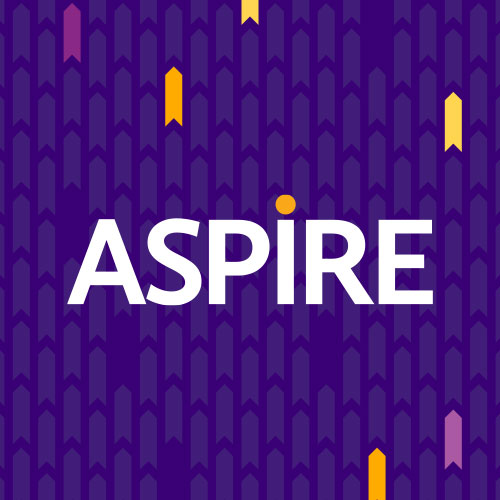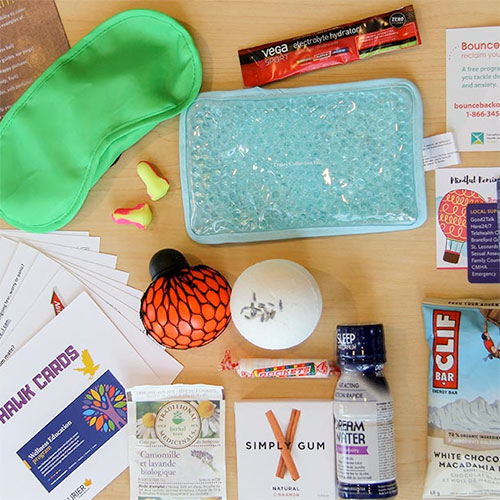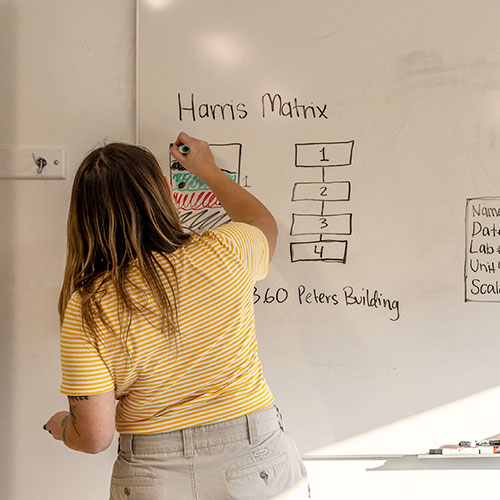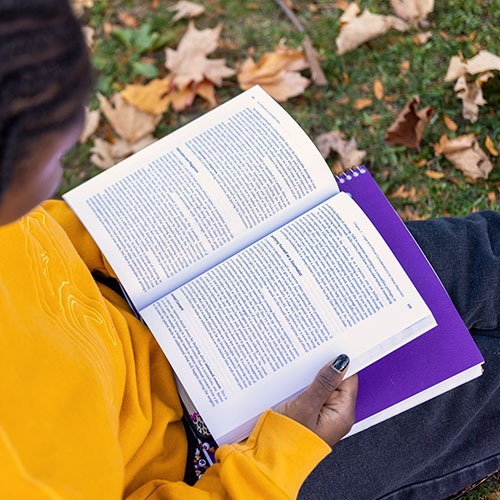Invest in your future and earn the Aspire Certificate, which is designed to complement your academic program by providing opportunities to develop a range of skills and competencies.
To earn the certificate, complete five workshops in at least two Aspire pillars.
Learn more details about the Aspire Professional Development Certificate.

Some of the workshops are self-directed on MyLearningSpace.
Take charge of your personal well-being. Our workshops provide you with the skills to manage your time, mental health, and work-life balance. Foster self-awareness and mindfulness in your personal, scholarly, and professional life.
All sessions are virutal, 1 hour in length and open to all students.
The comparison trap is a common experience, where we compare ourselves to others, leading to experiences like imposter syndrome and FOMO. In this workshop, we will learn about how the comparison trap shows up in our lives, and strategies for noticing and managing it.
Skills Acquired:
Facilitator: Claire Howarth, MPH, MSW, RSW, Wellness Education Coordinator
Sessions offered: Mar. 24, 2026 at 4:00 p.m. Register for the Mar 24 Zoom workshop.
Join us to learn about growth mindset, and the power of self-reflection. We will celebrate and reflect on your journey through the term, explore the meaning of success, and learn about how growth mindset can support us in our journeys.
Skills Acquired:
In this workshop, you will...
Facilitator: Claire Howarth, MPH, MSW, RSW, Wellness Education Coordinator
Sessions offered: Apr. 7 at 2:00 p.m. Register for the April 7 Zoom workshop.

Our teaching development workshops offer transferrable teaching skills and foundational teaching knowledge that can be used for both the classroom and the workplace. Learn about different pedagogies and hear from experienced staff and colleagues as they reflect on their experiences and share their knowledge.
All sessions are 90 minutes in length.
Self-paced Microsoft Stream recorded workshops:
Does the room go quiet when you ask a question? Do you see blank stares when you try to get students talking? Knowing how to actively engage your students to enhance learning is an important skill. This workshop will introduce you to some strategies to both inginte and sustain student engagement.
Skills Acquired: Student Engagement, Active Learning, Motivation Strategies, Classroom Communication
Facilitators: Inderjit Saini and Savannah Lesperance
Sessions offered:
For teaching assistants, recognizing how and when to provide feedback to learners can be a tricky task. Concerns about how much and the quality of the feedback provided is fundamental to students' success. In this introductory session, participants will spend time exploring the complexity of providing guidance to learners as a TA and explore the idea of feedforward to support ongoing student development.
Skils Acquired: Reflective Practice, Communication Skills, Student Development Feedback/Feedforward Strategies
Facilitators: Inderjit Saini and Savannah Lesperance
Sessions offered:

In any academic or professional environment, strong communication and leadership skills are critical. Perfect your writing and oral presentation skills with help from specialists in the field.
On-going self-paced learning on MyLearningSpace:
First, register for the workshop in MyLS by selecting "Self Registration," then select the workshop Library Research Workshops link and select "Register" in MyLS as in the example highlighted below:

Navigating the peer-review process can be one of the most challenging parts of getting your research published. This workshop will explain how the peer-review process works in academic publishing and provide strategies on how to successfully work with editors of academic journals. In doing so, we will look at ways to integrate peer-review feedback and improve your article manuscript. The Zoom link for the workshop is included below. The Zoom link will also be emailed to all registered participants prior to the workshop. You can register for the workshop on the Student Success Portal.
Skills Acquired: Professionalization & Communication
Facilitator: Elliot Worsfold
Sessions Offered:
Are you writing a major research paper, Master’s thesis, or PhD dissertation? In this workshop, we will share strategies for approaching large writing projects. We will discuss a range of writing habits, including goal setting, outlining, and writing techniques (e.g., Pomodoro Technique and freewriting). Participants are encouraged to share their uncertainties, challenges, and successes for approaching large writing large projects. The Zoom link for the workshop is included below. The Zoom link will also be emailed to all registered participants prior to the workshop. You can register for the workshop on the Student Success Portal.
Skills Acquired: Professionalization & Communication
Facilitator: Elliot Worsfold
Sessions Offered:

Move successfully into your next career phase. ASPIRE workshops, run by Career Centre professionals, can help you to market your transferable skills, build your resumé, cover letter, and LinkedIn profile, and network and interview with confidence, among many other skills.
All sessions are virtual on Zoom.
Be prepared and ace your interview. What are employers really looking for from candidates? Join us as we discuss how to prepare for a successful job interview. Participants will learn how to identify and present your best qualifications, formulate effective answers to common interview questions and strategies to help reduce stress and maximize your performance. This session is offered on Zoom. Please register to receive the event link.
Skills Acquired: skills articulation, interview strategies
Facilitator: Lisa Roy, Career Centre
Sessions offered:
Discover Your Knowledge, Skills and Attributes. Can you identify what competencies you have and what employers are seeking? Align your skills with your career goals in this workshop. You will be able to identify and assess your personal competencies, identify areas for development and learn how to showcase the value of your experiences to an employer. This session is offered on Zoom. Please register to receive the event link.
Skills Acquired: competencies identification and articulation
Facilitator: Lisa Roy, Career Centre
Sessions offered:
In today's professional context, an online presence is essential. Participants in this workshop will learn about tools and strategies to build your LinkedIn profile, represent yourself professionally, maximize your career research and build your online networks.
This session is offered on Zoom. Please register to receive the event link.
Skills Acquired: Digital tools for networking, professional branding and job searching.
Facilitator: Lisa Roy, Career Centre
Sessions offered:
You've nailed the interview and landed the job. Congratulations! Now, it's time to shift gears and discover how to flourish in your new work environment.
In this workshop, we'll explore strategies to help you thrive: navigating policies, procedures, and unwritten rules, managing expectations, and building meaningful professional connections. Our checklists will help you prepare. By asking the right questions and fully understanding your responsibilities, you'll hit the ground running and start adding value to your new team immediately! This session is offered on Zoom. Please register to receive the event link.
Skills Acquired: Navigating workplace culture and expectations
Facilitator: Lisa Roy, Career Centre
Sessions offered:

Research is a huge component of many Masters, PhD and Postdoctoral Fellow programs. Workshops in our research pillar can help you to complete the work that you are doing at Laurier and help prepare you for future research opportunities. Through workshops ranging from how to develop a research question, to managing your data, our research experts will teach you how to translate your technical work for non-specialist audiences.
Self-paced MyLearningSpace modules:
Students must self-register for "Libary Reserach Workshops" on MyLearning Space to gain access to these courses.
Learn the very basics (or come for a refresher) on how Canadian laws are made, their key parts and where to find them. Discover resources for the analysis of laws and their impact, and how they have been interpreted in judicial proceedings.
Skills Acquired: Awareness of key legal instruments. Awareness of how a Bill becomes a Law. Where to look for the different parts of Law. Discovery of sources for legal commentary.
Facilitator: Helene LeBlanc
Sessions offered:
This workshop will guide you through the best tools and strategies for finding credible, up-to-date business information to support your academic or entrepreneurial projects.
Skills Acquired: Identify and access credible industry analysis reports and financial performance data; Locate company financials, competitive landscapes, market trends, and consumer lifestyle insights.
Facilitator: Yanli Li
Sessions offered:
This one-hour session will cover some of the nuts and bolts of scholarly publishing in the sciences. The workshop will introduce tools to help researchers identify appropriate journals for publication, different ways to evaluate journals, and how to prepare your manuscript for submission. By the end of the workshop, you will be able to: Craft a better manuscript for journal submission Select an appropriate journal Evaluate journals based on impact metrics Identify open access journals vs. traditional publishing models.
Skills Acquired: Scholarly journal evaluation.
Facilitator: Joanna Blair
Sessions offered:
Learn strategies for finding “policy documents”, the steps that led to their creation, a few ways for finding policy analysis, and how you might consider the merits of these arguments.
Skills Acquired: Awareness of what "public policy" can constitute. Ideas on how to strategize your searches for finding "policy documents". Tactics for finding the background information to the policy at hand. Strategies for looking for and evaluating policy analysis.
Facilitator: Helene LeBlanc
Sessions offered:
Learn the very basics (or come for a refresher) on how Canadian laws are made, their key parts and where to find them. Discover resources for the analysis of laws and their impact, and how they have been interpreted in judicial proceedings.
Skills Acquired: Awareness of key legal instruments. Awareness of how a Bill becomes a Law. Where to look for the different parts of Law. Discovery of sources for legal commentary.
Facilitator: Helene LeBlanc
Sessions offered:
